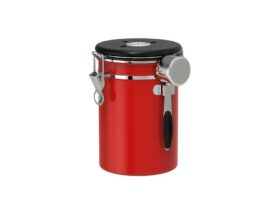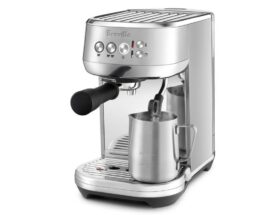
Pros and cons of Soy Coffee: Should you Drink Soy Coffee?
Soy coffee is a unique coffee variant that offers a healthier alternative for coffee enthusiasts. Crafted from soybeans and soy milk, it provides a tasty and slightly sweeter version of regular coffee. In this blog, we will explore the pros and cons of soy coffee, and ultimately answer the question: Should you drink soy coffee? We will delve into various soy coffee recipes, discuss the potential benefits of soy coffee consumption, compare it to other alternatives like mushroom coffee, and address any concerns surrounding soy milk. Whether you are a vegan, lactose-intolerant, health-conscious, or simply a coffee lover, this blog will provide valuable insights into the world of soy coffee. So, grab a cup of your favorite beverage and let’s dive in!
Interesting fact: Did you know that major coffee chains like Starbucks and Dunkin' Donuts offer soy coffee alternatives to cater to a growing demand?
Table of Contents
Exploring Soy Coffee Recipes
One of the great things about soy coffee is its versatility. You can create a variety of delicious drinks using soy milk as a base. Here are some soy coffee recipes to try:
Soy Latte with Cinnamon and Vanilla
This recipe combines the smoothness of soy milk with the warmth of cinnamon and the sweet aroma of vanilla. Simply brew your favorite coffee, heat up soy milk, and add a sprinkle of cinnamon and a dash of vanilla extract. Mix it all together for a comforting and flavorful soy latte.
Soy Caramel Macchiato
If you’re a fan of caramel flavors, this soy coffee recipe will be a treat. Start by frothing soy milk until it’s nice and creamy. Brew a strong cup of coffee and pour it over the frothed soy milk. Drizzle some caramel sauce on top for an extra touch of sweetness.
Soy Mocha Latte
For chocolate lovers, a soy mocha latte is the perfect indulgence. Prepare a shot of espresso and melt some dark chocolate in a saucepan. Mix the melted chocolate with soy milk and froth until it’s velvety smooth. Pour the espresso over the frothed soy milk and enjoy the rich chocolaty goodness.
Soy Chai Latte
Soy milk adds a creamy and subtle sweetness to a classic chai latte. Brew a cup of strong black tea with your choice of chai spices (such as cinnamon, cardamom, ginger, and cloves). Heat up soy milk and mix it with the brewed chai tea. Add a sprinkle of cinnamon on top for an extra flavorful twist.
Soy Cappuccino with Maple Syrup
This recipe combines the frothy delight of a cappuccino with the natural sweetness of maple syrup. Brew a shot of espresso-at-home”>espresso and froth soy milk until it’s thick and creamy. Pour the espresso into a cup and top it with the frothed soy milk. Drizzle some maple syrup on top for a touch of sweetness.
These soy coffee recipes are just a starting point. Feel free to experiment and customize them according to your taste preferences. With soy milk’s naturally sweet flavor, you can create delicious and unique soy coffee drinks that rival any coffee shop creation.
Tips and Recommendations
1. Choosing the Right Soy Coffee: When selecting soy coffee, consider the flavor profile, certification, acidity level, isoflavone content, and caffeine content. If you prefer a stronger flavor, opt for a darker roast. Look for certified organic options to ensure the soybeans are grown without harmful pesticides. Additionally, check the acidity level if you have a sensitive stomach. Lastly, if you are specifically consuming soy coffee for its isoflavone content, check the label for the amount of isoflavones present.
2. Experiment with Soy Coffee Recipes: While a simple soy latte is a popular choice, don’t be afraid to get creative with your soy coffee recipes. Try adding a hint of cinnamon and vanilla to your soy latte for an extra flavor boost. For a sweeter indulgence, make a soy caramel macchiato by drizzling caramel sauce on top. If you love the combination of chocolate and coffee, a soy mocha latte will satisfy your cravings. Exploring different recipes will keep your taste buds excited.
3. Consider Soy Milk Powder: If you often find yourself running out of soy milk or need a more convenient option, consider using soy milk powder. It can be easily stored and mixed with water whenever you want to enjoy a cup of soy coffee. Just make sure to follow the instructions provided on the packaging for the right water-to-powder ratio.
4. Be Mindful of Potential Allergies: While soy coffee offers allergy-friendly options, it’s important to note that some individuals may have soy allergies. If you or someone you know is allergic to soy, it’s best to avoid soy products altogether and explore other milk alternatives such as almond or oat milk.
5. Enjoy in Moderation: As with any food or drink, moderation is key. While soy coffee can be a healthier alternative, excessive consumption may not be advisable for everyone. It’s always a good idea to listen to your body and consult with a healthcare professional if you have any concerns or specific health conditions.
By following these tips and recommendations, you can make the most out of your soy coffee experience and enjoy its benefits while being mindful of any potential considerations. Cheers to a delicious and healthier cup of soy coffee!
Frequently Asked Questions
1. Is soy coffee good for you?
Soy coffee can be a healthier option for those who are lactose intolerant or have dairy allergies. It provides a similar taste and texture to regular coffee but with a slightly sweeter touch due to the sugar content in soy milk. It can also offer various health benefits, but it’s important to consume soy coffee in moderation as part of a balanced diet.
2. What is soy milk nutrition?
Soy milk is rich in essential nutrients such as protein, fiber, vitamins (like vitamin D and vitamin B12), minerals (like calcium and iron), and antioxidants. It is also low in saturated fat and cholesterol-free, making it a nutritious choice for individuals looking for plant-based alternatives to dairy milk.
3. Is soy milk bad for you?
Soy milk is generally considered safe for most people when consumed in moderation. However, individuals with soy allergies, especially children, should avoid soy products due to potential allergic reactions. Additionally, excessive consumption of soy products may have negative effects on certain individuals, such as those with mineral deficiencies or hormonal imbalances.
4. Can soy coffee help with hot flashes?
Some studies suggest that soy products, including soy coffee, may help reduce the frequency and severity of hot flashes in menopausal women. This is because soy contains natural compounds called isoflavones, which have been found to have mild estrogen-like effects on the body.
5. Does soy coffee have caffeine?
Yes, soy coffee can contain caffeine since it is typically brewed using coffee beans. However, the caffeine content can vary depending on the type of coffee beans used and the brewing method. If you are sensitive to caffeine, it is advisable to choose decaffeinated soy coffee or opt for brands that offer low-caffeine options.
6. Can I add CBD oil to soy coffee?
While it is possible to add CBD oil to soy coffee, it is important to note that CBD oil is best mixed with thicker liquids like smoothies or soups rather than thin liquids like coffee. This is because CBD oil may not blend well with coffee and may not provide even distribution of CBD throughout the drink. It is recommended to consult with a healthcare professional before combining CBD oil with any food or beverage.
In Conclusion
Soy coffee offers a healthier alternative for coffee lovers who are lactose intolerant, have dairy allergies, or prefer plant-based options. It can be easily prepared at home or purchased from major coffee chains like Starbucks and Dunkin’ Donuts. However, individuals with soy allergies, especially children, should avoid soy products to prevent potential allergic reactions.
Soy coffee provides numerous benefits, such as promoting younger-looking skin, reducing hot flashes, improving sleep, and enhancing overall health. It is a great choice for vegans, lactose-intolerant individuals, health-conscious individuals, those with allergies, environmentalists, and coffee enthusiasts.
When choosing soy coffee, consider factors like flavor, certification, acidity, isoflavone content, and caffeine content. Additionally, it’s important to be aware of the potential pros and cons of soy consumption, including its heart health benefits, high protein content, and potential effects on mineral deficiencies, excessive estrogen levels, decreased fertility, and digestion.
For more coffee-related articles and information, visit [Ten Coffees](https://tencoffees.com/). If you have any comments or questions about soy coffee or other coffee topics, we’d love to hear from you. Engage with us through the comments section below and let’s continue the conversation!









